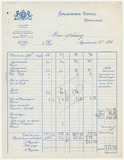The Emergency Rescue Committee
The Emergency Rescue Committee
Viele […] glaubten bei jedem Klingeln, bei jedem Klopfen an der Tür und jedem Schritt auf der Treppe, die Polizei sei da, um sie abzuholen und an die Gestapo auszuliefern. Verzweifelt suchten sie nach Mitteln und Wegen, um sich aus der Schlinge zu befreien, die sich plötzlich um ihren Hals gelegt hatte.
[Many […] feared that every ring of the bell, every knock on the door and every footstep in the stairwell could be the police, come to take them away and hand them over to the Gestapo. They desperately sought for ways and means to free themselves from the noose they felt had suddenly been placed around their necks. (ed. trans)]
Varian Fry, Auslieferung auf Verlangen [Surrender on Demand], 1940/1941
The Emergency Rescue Committee (ERC) was established in late June 1940 in New York by German and American intellectuals, academics and scientists. The aim of the aid organisation was to rescue persecuted artists and politicians from France to the United States. The immediate cause for this was the ceasefire agreement concluded between Germany and France on 22 June 1940. In Article 19 (2) of the agreement, France had undertaken to extradite any Germans named by the German government. Thus, France and also the unoccupied part in the south of the country had become a trap for the refugees from Germany.
The journalist Varian Fry was sent on behalf of the organisation to France to organise assistance to the refugees on site. Equipped with lists of names, Fry began in August 1940 in Marseille with the establishment of the Centre Américain de Secours (CAS). Up to 15 employees were temporarily working in the French outpost of the ERC, including the writer Hans Sahl, who himself was also one of the organisation's clients.
The ERC/CAS organised financial aid for refugees, helped them collect the papers for their continued flight and worked closely with other aid agencies, such as the Unitarians, HICEM, the International Relief Association and the American Guild for German Cultural Freedom. Under the guise of this activity, the CAS also used illegal methods such as providing refugees with forged papers or leading on foot through the Pyrenees to Spain.
This illegal work of the ERC/CAS did not remain hidden from the French police, and after brief detention Varian Fry was expelled from France in September 1941. Severely limited in its possibilities by financial and personal difficulties, the CAS continued to work until it was closed by the French authorities on 2 June 1942. It is impossible to say exactly how many people the ERC/CAS helped escape by legal or illegal means, but it is now assumed that the ERC/CAS was involved in 1,800 cases. If partners and families are included, the number presumably rises to 4,000 people.
In early 1942, the ERC grouped together with the International Relief Association to form the International Rescue and Relief Committee. The aid organisation still exists today as the International Rescue Committee.
Further reading:
Fry, Varian: Auslieferung auf Verlangen. Die Rettung deutscher Emigranten in Marseille 1940/41, München: Hanser 1986
Ohne zu zögern. Varian Fry: Berlin-Marseille-New York. Berlin: Aktives Museum 2007







